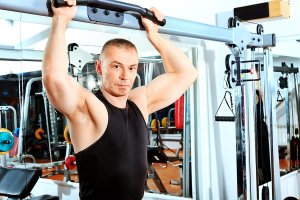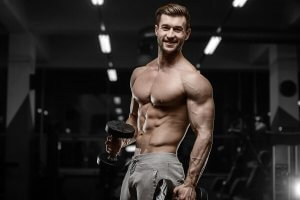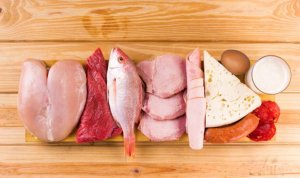Bodybuilding: Training and Eating

The history of bodybuilding tells us that man has always worshiped his body, for lots of different reasons. From accentuating their physical qualities to surviving in a dangerous ancient world, to fighting for sport and working out to feel good, man has always loved the human body.
Introduction to bodybuilding and its risks
The search for perfection, having an amazing routine, and competing are the main goals. The information blitz is clear, and you can see it on the internet, in gyms and in books. Searching is easy, but there’s a big problem: you shouldn’t take the advice of everything you read on the internet.
Guidelines and advice without scientific basis can cause serious damage to your health and physical integrity. In fact, there could be small consequences or even death.
Most of the guidelines that athletes follow have to do with sports routines in machines, food, hydration and supplements. However, if they aren’t the right ones, there could be both short and long term risks.
The first potential risk with bodybuilding is unnatural muscle growth. Participants in this sport do this through regular, vigorous exercise and special high protein diets. Also, many people try to increase their muscle size as quickly as possible, without knowing the process and its limits.
Statistical data
Bodybuilding is becoming more and more popular. In Spain, according to the 2015 Survey of Sports Habits, bodybuilding is one of the most practiced sports every week.
As for how many men and women do it, there’s a greater male presence. The most common age range is between 15 and 24 years, and there isn’t a lot of participation in people above 55.

Bodybuilding goal
Preparing for a bodybuilding competition involves drastic reductions in body fat and maintaining muscle mass. Normally, bodybuilders do this through decreased caloric intake, intense strength training and increased cardiovascular exercise.
Competitors use lots of dietary and supplementation strategies to prepare. Some have scientific basis, but many don’t.
In fact, some of the supplements that do have evidence are creatine, caffeine and beta-alanine. However, others need further research.
Therefore, it’s important for bodybuilders to know the risks of developing an eating disorder and body image issues. To avoid problems, they should use a personal trainer, nutritionist and psychologist.
Bodybuilder training
One of the issues that beginners are concerned about is how to choose the best program and exercises so they can reach their goals.
When you go to a sports center, you can expect the person in charge of the gym to be qualified enough to create an exercise program. This person can customize a routine that optimize’s the bodybuilder’s time and effort.
However, this isn’t always the case. In some cases, you’re just given a printed routine with a general overview of how to do the exercises.
In other cases, the gym doesn’t just have monitors, but rather offers personal trainers that you have to pay more for. Then, this can lead to people scouring the internet to find information for free.
Diet for bodybuilding
Typical errors
It’s important to start this section by emphasizing that not all preparation techniques that bodybuilders use are scientifically proven. For example, some unsuccessful methods to lose fat and build muscle are:
- Dehydration
- Long fasting periods
- Caloric restrictions
- Inadequate cardiovascular exercise
- Misuse of diuretics and anabolic steroids
Macronutrient distribution
Bodybuilding nutrition isn’t an exact science. In fact, there isn’t concrete data to recommend the amount of macronutrients you should take. According to information from a scientific review in the journal of the International Society for Sports Nutrition, this could be an option:
- The protein intake should be very high, within 4.6 to 6.2 grams of protein per pound per day.
- It’s recommended that the fats should contribute between 15 and 30 percent of your total calories.
- As for carbohydrates, they should be the remaining percent.

Other important keys
The weekly weight loss recommendation is 0.5 to one percent of your total weight. For the frequency of daily meals, there are no specific studies for bodybuilders. However, it depends on the type of exercise you do during different training sessions.
It’s worth noting that these athletes need to be carefully monitored. Professionals need to check their diets are correct at each stage.
In this sense, some general recommendations would be to follow a varied diet, not avoid any macronutrients, exercise regularly but not too much, and take rest days.
The history of bodybuilding tells us that man has always worshiped his body, for lots of different reasons. From accentuating their physical qualities to surviving in a dangerous ancient world, to fighting for sport and working out to feel good, man has always loved the human body.
Introduction to bodybuilding and its risks
The search for perfection, having an amazing routine, and competing are the main goals. The information blitz is clear, and you can see it on the internet, in gyms and in books. Searching is easy, but there’s a big problem: you shouldn’t take the advice of everything you read on the internet.
Guidelines and advice without scientific basis can cause serious damage to your health and physical integrity. In fact, there could be small consequences or even death.
Most of the guidelines that athletes follow have to do with sports routines in machines, food, hydration and supplements. However, if they aren’t the right ones, there could be both short and long term risks.
The first potential risk with bodybuilding is unnatural muscle growth. Participants in this sport do this through regular, vigorous exercise and special high protein diets. Also, many people try to increase their muscle size as quickly as possible, without knowing the process and its limits.
Statistical data
Bodybuilding is becoming more and more popular. In Spain, according to the 2015 Survey of Sports Habits, bodybuilding is one of the most practiced sports every week.
As for how many men and women do it, there’s a greater male presence. The most common age range is between 15 and 24 years, and there isn’t a lot of participation in people above 55.

Bodybuilding goal
Preparing for a bodybuilding competition involves drastic reductions in body fat and maintaining muscle mass. Normally, bodybuilders do this through decreased caloric intake, intense strength training and increased cardiovascular exercise.
Competitors use lots of dietary and supplementation strategies to prepare. Some have scientific basis, but many don’t.
In fact, some of the supplements that do have evidence are creatine, caffeine and beta-alanine. However, others need further research.
Therefore, it’s important for bodybuilders to know the risks of developing an eating disorder and body image issues. To avoid problems, they should use a personal trainer, nutritionist and psychologist.
Bodybuilder training
One of the issues that beginners are concerned about is how to choose the best program and exercises so they can reach their goals.
When you go to a sports center, you can expect the person in charge of the gym to be qualified enough to create an exercise program. This person can customize a routine that optimize’s the bodybuilder’s time and effort.
However, this isn’t always the case. In some cases, you’re just given a printed routine with a general overview of how to do the exercises.
In other cases, the gym doesn’t just have monitors, but rather offers personal trainers that you have to pay more for. Then, this can lead to people scouring the internet to find information for free.
Diet for bodybuilding
Typical errors
It’s important to start this section by emphasizing that not all preparation techniques that bodybuilders use are scientifically proven. For example, some unsuccessful methods to lose fat and build muscle are:
- Dehydration
- Long fasting periods
- Caloric restrictions
- Inadequate cardiovascular exercise
- Misuse of diuretics and anabolic steroids
Macronutrient distribution
Bodybuilding nutrition isn’t an exact science. In fact, there isn’t concrete data to recommend the amount of macronutrients you should take. According to information from a scientific review in the journal of the International Society for Sports Nutrition, this could be an option:
- The protein intake should be very high, within 4.6 to 6.2 grams of protein per pound per day.
- It’s recommended that the fats should contribute between 15 and 30 percent of your total calories.
- As for carbohydrates, they should be the remaining percent.

Other important keys
The weekly weight loss recommendation is 0.5 to one percent of your total weight. For the frequency of daily meals, there are no specific studies for bodybuilders. However, it depends on the type of exercise you do during different training sessions.
It’s worth noting that these athletes need to be carefully monitored. Professionals need to check their diets are correct at each stage.
In this sense, some general recommendations would be to follow a varied diet, not avoid any macronutrients, exercise regularly but not too much, and take rest days.
All cited sources were thoroughly reviewed by our team to ensure their quality, reliability, currency, and validity. The bibliography of this article was considered reliable and of academic or scientific accuracy.
- Consejo Superior de Deportes. 2015. Encuesta de hábitos deportivos 2015.
- Helms ER et al. 2014. Evidence-based recommendations for natural bodybuilding contest preparation: nutrition and supplementation. Journal of the international society of sports nutrition, 11(1), 20
This text is provided for informational purposes only and does not replace consultation with a professional. If in doubt, consult your specialist.








